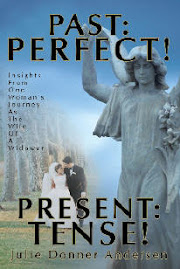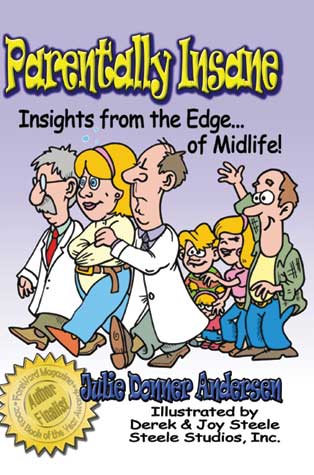Recently, I was misquoted on a blog written by a W (my words were taken out of context to further the blog owner's agenda). I would not have even noticed, as I rarely have time to read major blogs (large readership) that interest me, nevermind minor ones (small readership), such as his, that don't.
But when a member of The Official WOW/GOW Message Board contacted me personally about her search for information about grief in order to understand her W better (not completely, just BETTER), she was flabbergasted about the abject polarization she encountered by this particular woefully misinformed, mildly arrogant, and sadly pitiful blogger. Her angst: "I know I have a lot to learn about grief, but if those who have experienced it won't offer their expertise, and the present available literature is so complicated, where else can I go to find enlightenment?"
Indeed, it is difficult to find the best of both worlds, that being firsthand knowledge which has not been corrupted by judgement aganst those who would ask..in a society that is uncomfortable discussing such a "taboo" (in its collective mind) subject.
Grief...is hard. It is an elusive emotion very few understand. And if that weren't enough, it is not just an emotion but a journey as well...one that does not come with a timetable, a blueprint, guidelines, or set of rules, making grief all the more mysterious and complicated to those of us on the outside of it...which leads to assumptions and conjecture by a judgmental society that wants nothing more than to either put a patch of platitudes on it, sweep it under the proverbial rug, or ignore it completely until it goes away (which it never does!).
Grief's fallout (its complicated misery and mystery) is considered "taboo" to discuss; thus, ignorance of it has lead to a society that just doesn't get it...and is too uncomfortable with it to bother. Worst of all, grief is perpetual: it never ends, and continuously revisits itself. It can be diminished but never eradicated; coped with and managed, but never eliminated.
Enter those of us who just want to love a man who grieves. Hard as we try to comprehend this puzzling emotional journey, we fail miserably. Society, which encourages survivors to move on, happily accepts a GOW, but under one condition: she must not attempt to understand grief and just merrily, without question, accept a "lesser" role in her W’s heart. (Indeed, ignorance abounds on both sides of this proverbial fence!)
For example: When Ws congregate in their mutual misery, such as on a website or blog for Ws, they form an exclusive "club" which they feel no “outsider” should penetrate. Exclusive, because even if we “outsiders” have experienced similar loss, no two grief journeys are the same; thus, grief is one example of life experience where personal expertise seems to matter little. When it comes to a GOW’s beloved W’s loss, we are "damned if we do, and damned if we don't" try to understand it. Within the aforementioned exclusive club are those who would minimize our role, blaming us for our insecurity as they themselves label us as "less than" the sainted LW, thus perpetuating our insecurity that we will never be "as good" as she was to our Ws.
Sadly, these kinds of clubs, while at first offering survivors a much needed open-armed hug of acceptance in a world that doesn’t understand them, are usually led by those who believe letting go – the normal and natural recovery at the end of grief’s efforts - is but a fallacy, and equates to dishonoring the dearly departed. And those GOWs who would interfere with their mission of protecting, preserving, and canonizing their lost loves are the enemy.
In such clubs, there is no room for enlightenment. Grief is selfish, and can render its victim the same; thus, few members can see the forest for the trees. To them, their loss is all that counts, to the exclusion of others. They believe their loss has made them untouchably noble martyrs, and as such, they have, in turn, closed their minds to other, perhaps loftier, possibilities and theories. Instead of utilizing their experiences as teachable examples with which they could educate society about grief and, in turn, crush the ignorance they claim is rampant, they have achieved the opposite via alienation. They have lost their ability to communicate intelligently with the outside world in a rational manner as they sit atop their thrones of nobility, casting judgment after judgment against those with good intentions whose only desires are to love, help, sympathize with, and yes, understand grief and those who deal with it.
Indeed, a GOW faces a plethora of obstacles as she journeys alongside a W who grieves. Outsiders (society) and insiders (fellow survivors) are against her from the get-go. Friends rarely understand her loving a man who also loves another, as where else in Western culture is this acceptable, except perhaps for cults in Utah? Her own W can often be non-communicative and complicated. Worst of all, a GOW herself can often be her own worst enemy as her natural and normal insecurities rear their ugly heads. There are few resources available to the GOW to help her understand not only herself, but her W and his grief, too.
Whether we have experienced it or not, it’s not rocket science for ALL of us to admit that grief is hard. But if it is, then we ALL must admit that loving someone who has experienced loss is difficult, too. GOWs face seemingly insurmountable odds, especially when the obstacle of ignorance and the breakdown of communication are so commonplace.
I believe breaking down barriers is key. In the words of Rodney King, “Can’t we all just get along?” I don’t think it’s too much to ask, especially when the benefits far outweigh the present state of dysfunction between survivors and those who love them.
Thursday, March 31, 2011
Subscribe to:
Post Comments (Atom)










Question for Julie...
ReplyDeleteI am dating (4 months) a W whose wife died of cancer 4 years ago. I have not yet been invited to his house. LW's sister still lives with W. She arrived 5 plus years ago to help with her ailing sister and never moved out. She has since developed disabilities, has no job or place to go. W feels guilty in telling her to move out so that he can move on with his life (or so he says)
As a GOW, I think that he should take back his house, ask SIL to move in with LW's family.
Help!
Advice?
Miss L
Not wanting to drain the bandwidth resources of this blog's space by replying to you in depth here, I would istead like to invite you to please join me and the over 800 member of The Official WOW/GOW Message Board, which is a free board that you can access via my website at www.juliedonnerandersen.com. Your question is certainly a good one...so come join me and let's work together to solve your issue!
ReplyDeleteBlessings...JDA